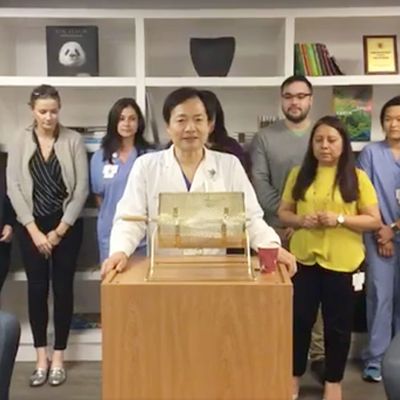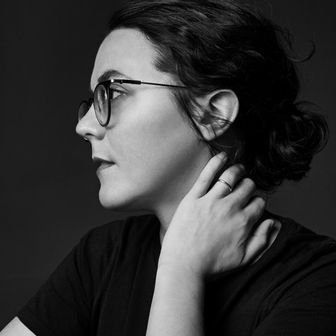
Last Friday, Dr. John Zhang of Manhattan’s New Hope Fertility Center addressed a Facebook Live audience. “Thank you for participating in this very exciting activity and opportunity,” he said to describe what was about to happen: the lottery drawing of 30 names, all of whom had entered to win a free cycle of IVF courtesy of his clinic.
Dr. Zhang, flanked by staff members, stood at a podium showcasing a cagelike gold cylinder and a to-go cup of coffee. After his opening remarks, he cranked the cylinder’s wooden handle, the folded-up papers inside spinning into a flurry. Then he unlatched an opening on the cylinder’s side, fumbling a bit, and announced the first winner. Partway through the second, the doctor changed his mind, gesturing to a man in scrubs off to his right, who came forward to help inform E.Z. from Utah — and the rest of the viewers — of her good fortune.
“Sorry,” Dr. Zhang said mid-spin. “This is not very high-tech.” He drew five more names, handing each over to the staff member to announce them, before wishing everyone luck and exiting the frame with his to-go cup and a word about needing to see his “lovely patients.” Various staff members stepped up to draw the winning names in his wake.
Like any contest, New Hope’s IVF lottery is not without fine print: Winners receive exactly one fresh IVF cycle, an offering that the clinic’s contest materials make clear is not necessarily a comprehensive treatment. The cost of drugs (ranging from $500 to $4,000, depending on a patient’s needs), for example, is not factored into the prize, nor is the cost of any egg or sperm freezing (though winners receive six months’ worth of complimentary storage). PGD and PGS (preimplantation genetic diagnosis and preimplantation genetic screening), considered to increase the odds of IVF’s success, are not part of the prize. Still: New Hope says the total cost of all 30 prizes could amount to about $1 million worth of treatment.
Throughout the video’s livecast, comments climbed up the screen as emoji bobbed along like balloons. Viewers crossed fingers, congratulated the winners, and scattered “baby dust” over all. Some excitedly mentioned their whereabouts and activities as they watched; one said she was watching with headphones on at a graduation, while another wrote she was watching on behalf of her cousin, who had entered the contest but was unable to watch live. “Egypt!” a commenter wrote as the location of a winner was announced. “Wow.”
Press for what the New York Times called “Baby-Making by Lottery” is not the first time Dr. Zhang has made headlines. Zhang was also involved with the so-called “three-parent baby,” a new procedure that addresses genetic issues by using DNA from three people, gene splicing, and IVF. Controversially, Zhang’s team performed the procedure in Mexico, which is largely unregulated. (The United Kingdom approved the procedure last year, and granted its first official facility — Britain’s Newcastle University — permission to perform it earlier this year. Such approval does not currently exist in the United States.)
At the conclusion of New Hope’s Facebook Live video, a man in a tie stepped up to the podium. “Congratulations to the 30 people who won!” said the staff member, who later identified himself via email as Geoffrey Hawes, New Hope’s director of marketing. Hawes reminded the audience that the lottery was in support of National Infertility Awareness Week (which was April 23 to 29 this year), pointing out that infertility “affects a lot of people.” (From the New York Times: “Dr. Zhang decided he wanted to make the effort [to spread awareness of infertility] mean something, that it should be, as he put it, like Restaurant Week, when New York diners are offered reduced prices, in part to attract those who might not otherwise be able to afford the experience.”)
Hawes’s concluding statement turned out to be a little bit incorrect: As viewers were quick to point out, New Hope drew 28 names, not 30. In a second video, with about half the viewership of the first, a cheerful voice jokingly commands urgency over an off-camera crowd’s light laughter. Shaky camerawork gives way from someone’s feet to a new focus on the podium, where Hawes smiles good-naturedly and addresses the camera again. “Hey, guys — HI. So apparently, we were short two numbers.” Winners 29 and 30 — from Texas and New Jersey, respectively — were announced in this second video.
After the lottery, Hawes told me that over 500 people entered the drawing. Many, he explained, were same-sex couples, who face extra steps and financial hurdles when pursuing IVF. “We had so many people saying that the inability to have a child was tearing their relationships apart,” he said, “and that the only thing stopping them was money.” The clinic didn’t ask for stories, but many entrants offered them up anyway (“I think people thought it would give them an edge,” said Hawes).
Of the math concerning $1 million worth of treatment (which works out to be over $30,000 per winner), Hawes said New Hope isn’t saying that IVF always costs $30,000 at their clinic — it doesn’t — but that the figure takes into account a range of possibilities. “When you add up the time our staff and doctors spend, the insurance-verification team, the call-center scheduling, the lab techs, blood techs, nurses, MA’s, anesthesiologist, plus all the extra monitoring they might need … it all adds up fast.” Some winners might need over $30,000 worth of treatment; some might need less.
According to Hawes, the clinic hopes to hold the lottery again next year. And no one who entered this year’s contest will walk away empty-handed: “For everyone who didn’t win, on behalf of Dr. Zhang and New Hope, we’d like to extend you all the offer of a free consultation via Skype,” he told the audience over Facebook Live on Friday. Winners and losers alike, he emphasized, would receive emails on Monday.


